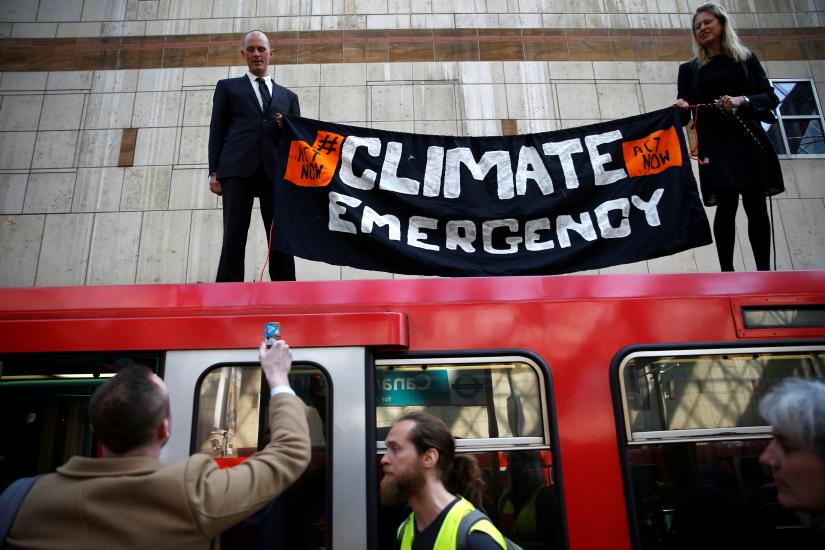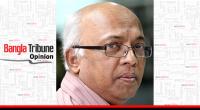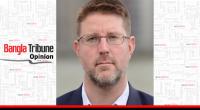 Climate change is threatening the world's food supply, according to a UN panel. The United Nations Intergovernmental Panel on Climate Change has brought more than 100 scientists together to study the situation. What they're saying is alarming: Not only are rising temperatures threatening the planet – they impact our eating habits negatively. The way food is farmed is drastically degrading the Earth's land, and scientists predict that's making global warming worse, and will lead to food shortages.
Climate change is threatening the world's food supply, according to a UN panel. The United Nations Intergovernmental Panel on Climate Change has brought more than 100 scientists together to study the situation. What they're saying is alarming: Not only are rising temperatures threatening the planet – they impact our eating habits negatively. The way food is farmed is drastically degrading the Earth's land, and scientists predict that's making global warming worse, and will lead to food shortages.
This is what the report of the UN IPCC is all about. It is a dire warning urging us to take prompt action to reduce the pressure on climate and on land at the same time. So, climate change is already increasing poverty in the world. It’s accentuating the problems we have with hunger. It’s impacting food systems. It’s decreasing harvests everywhere. It is making food security increasingly unstable. We still have a window left where we can act but the window is closing soon and all depends on how ambitious governments will be when it comes to cutting emissions and so far we see this ambition is not there. We have a criminal lack of ambition shown by all governments. Next year, they are supposed to submit new reduction targets under the Paris agreements and this will show whether or not the world will be able to control climate change.
The IPCC report is policy-neutral. It’s putting out the evidence. And, the evidence is that growing food to feed animals to feed people is a very inefficient way of utilizing the land. So, if we want more land for nature and if we want more land to be able to sequester carbon from the atmosphere and contribute to the solution to the climate change, then we need a free up land/we need to free more land to raise crops. And, one of the ways we can free up land is by switching to more plant-based diets. So, everyone does not need to go vegetarian or vegan. But, the rich people in the world who consume a lot of animal products to lower those will leave knock-on effects of both reducing the emissions from the animals themselves, reducing the emissions from the agriculture from all the inputs of the plants that are fed to the animals. And, this will slow down the rate of deforestation on the new land that’s required to feed this intensive system of producing so many animals. Now, just to get an idea of the scale of animal production and its impact on the natural world is: if you weighed all the land mammals of all of Earth’s land surface about 30% of that weight would be the weight of humans. 67% of that weight would be the weight of our livestock animals and just 3% would be the weight of all the wild animals. So, we’re really out of balance with the ecosystems and, one of those ways of maintaining an ecological balance is to reduce the amount of meat consumption among people who are the highest consumers of meat, that is the richest people. In this regard, the report is clear. If one wants to see that those outcomes are freeing up land to be able to tackle climate change then that’s got to come from somewhere. And, one of the most inefficient ways of using land is for meat production rather than producing crops directly for human consumption.
Now, just to get an idea of the scale of animal production and its impact on the natural world is: if you weighed all the land mammals of all of Earth’s land surface about 30% of that weight would be the weight of humans. 67% of that weight would be the weight of our livestock animals and just 3% would be the weight of all the wild animals. So, we’re really out of balance with the ecosystems and, one of those ways of maintaining an ecological balance is to reduce the amount of meat consumption among people who are the highest consumers of meat, that is the richest people. In this regard, the report is clear. If one wants to see that those outcomes are freeing up land to be able to tackle climate change then that’s got to come from somewhere. And, one of the most inefficient ways of using land is for meat production rather than producing crops directly for human consumption.
Though U.S. President Donald Trump announced earlier that he was pulling out the U.S. out of the climate by the year 2020 from Paris Climate accord, all other countries are staying. They are trying to increase the SUPPORT they have when it comes to climate action at home. So, there’s support all around except the United States. Other countries are tackling the climate crisis. So, there is a lot of action and legislation on the federal state level for instance consumers, people, citizens; they all aware of the growing climate crisis. And, we will have to get the U.S. back on board of course. There is no progress not at the scale and the speed we need. Renewable energies are getting ground everywhere. Coal power is phased out in many countries including Germany. The world is moving on and the U.S. will have to step up.
Finally, one problem which is a great barrier to any shift in consumer behaviour is dishonest food pricing. If you’re a farming intensively using lots of chemical fertilizers and pesticides, your production earns more than if you’re farming sustainably. That’s because of the permanent damage caused to the environment by destroying natural capital leading to greenhouse gas emissions and of course public health problems It’s not charged to the farmers and food producers who caused it. And, that’s no fault of their own, it just that we don’t enforce the polluter pays principle. The affordability of sustainably produced food should be greater and this will encourage the shift that is necessary.
There is huge confusion amongst the public as to the question of what should they eat to be healthy? They simply switch to a plant-based diet that would solve the problem in the long run. By doing so, they’re part of the solution whereas they need to give up altogether eating the industrially produced factory-farmed poultry, dairy products which are part of the problem. And, they need to know the difference between the two. We need a proper education that encourages our doing the right thing and that needs to be aligned with the sustainable farming practices to replace the ones we’ve got at the moment.
Md. Sharif Hasan teaches International Relations at University of Rajshahi.
 Opinion
Opinion
30730 hour(s) 21 minute(s) ago ;
Morning 05:15 ; Friday ; Apr 19, 2024
What the latest IPCC report means?
Send
Md. Sharif Hasan
Published : 21:17, Aug 27, 2019 | Updated : 22:07, Aug 27, 2019
Published : 21:17, Aug 27, 2019 | Updated : 22:07, Aug 27, 2019
0 ...0 ...
/ab/hb/
Topics: Top Stories
***The opinions, beliefs and viewpoints expressed in this article are those of the author and do not reflect the opinions and views of Bangla Tribune.
- KOICA donates medical supplies to BSMMU
- 5 more flights to take back British nationals to London
- Covid19: Rajarbagh, Mohammadpur worst affected
- Momen joins UN solidarity song over COVID-19 combat
- Covid-19: OIC to hold special meeting
- WFP begins food distribution in Cox’s Bazar
- WFP begins food distribution in Cox’s Bazar
- 290 return home to Australia
- Third charter flight for US citizens to return home
- Dhaka proposes to postpone D8 Summit
Unauthorized use of news, image, information, etc published by Bangla Tribune is punishable by copyright law. Appropriate legal steps will be taken by the management against any person or body that infringes those laws.
Bangla Tribune is one of the most revered online newspapers in Bangladesh, due to its reputation of neutral coverage and incisive analysis.
F R Tower, 8/C Panthapath, Shukrabad, Dhaka-1207 | Phone: 58151324; 58151326, Fax: 58151329 | Mob: 01730794527, 01730794528


